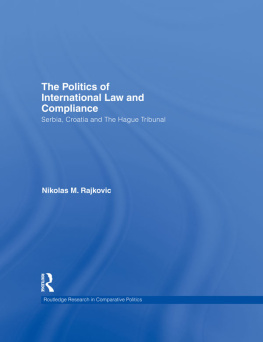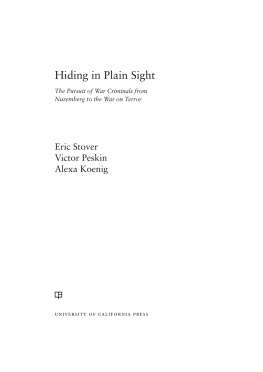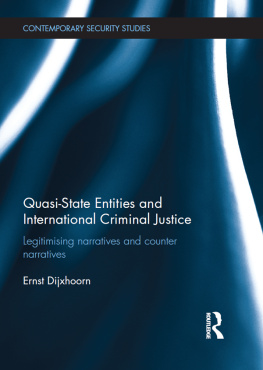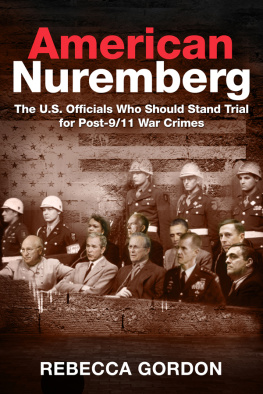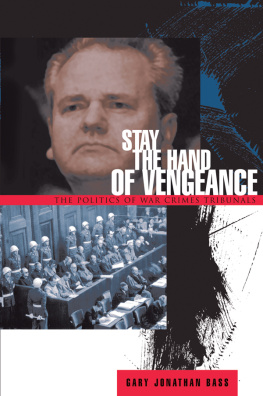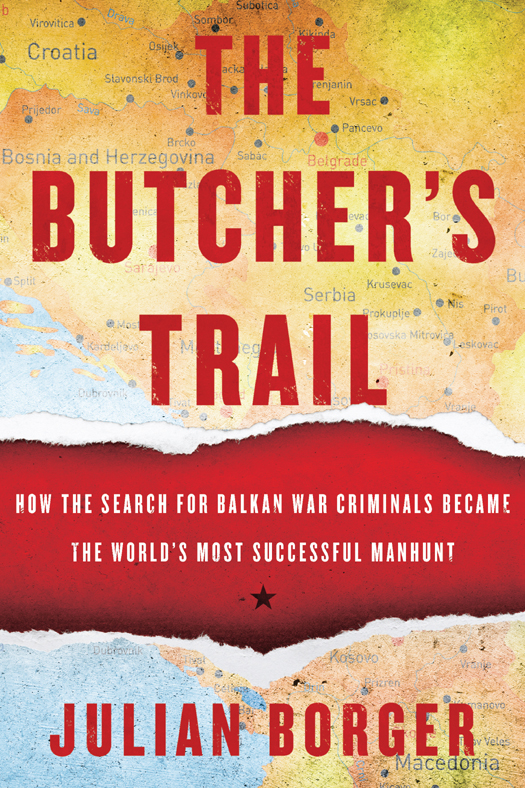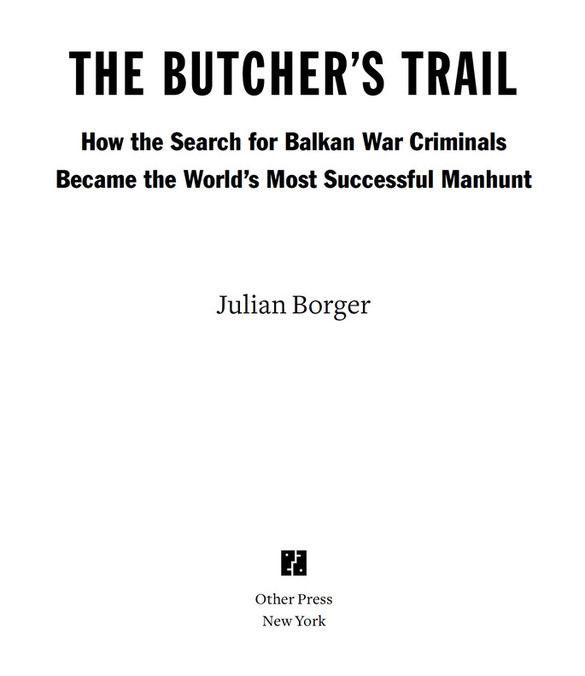Copyright 2016 by Julian Borger
Maps on endpapers and by Valerie Sebestyen.
Production editor: Yvonne E. Crdenas
All rights reserved. No part of this publication may be reproduced or transmitted in any form or by any means, electronic or mechanical, including photocopying, recording, or by any information storage and retrieval system, without written permission from Other Press LLC, except in the case of brief quotations in reviews for inclusion in a magazine, newspaper, or broadcast. For information write to Other Press LLC, 267 Fifth Avenue, 6th Floor, New York, NY 10016. Or visit our Web site: www.otherpress.com
The Library of Congress has cataloged the printed edition as follows:
Borger, Julian.
The butchers trail : how the search for Balkan war criminals became the worlds most successful manhunt / by Julian Borger.
pages cm
Includes bibliographical references.
ISBN 978-1-59051-605-8 (hardback : acid-free paper)
ISBN 978-1-59051-606-5 (e-book)
1. Karadi, Radovan V., 1945 2. Mladi, Ratko. 3. Gagovi, Dragan, 1960
4. Miloevi, Slobodan, 19412006. 5. Yugoslav War, 19911995Atrocities. 6. War crimes investigationHistory20th century. 7. International Tribunal for the Prosecution of Persons Responsible for Serious Violations of International Humanitarian Law Committed in the Territory of the Former Yugoslavia since 1991. 8. Yugoslav War, 19911995Biography. 9. War criminalsFormer Yugoslav republicsBiography. 10. Fugitives from justiceFormer Yugoslav republicsBiography. I. Title.
DR 1313.7 .A 85 B 66 2016
341.690268dc23
2015016962
v3.1
For Benji
CONTENTS
AUTHORS NOTE
ON LANGUAGE, SPELLING, AND ETHNICITY
WORDS MATTER , and they matter doubly in the countries that emerged from Yugoslavia. The majority Yugoslav language used to be known as Serbo-Croat, but that hyphenated term now offends most people in the three principal nations that speak it: Bosnia and Herzegovina, Croatia, and Serbia. They individually refer to it as Bosnian, Croatian, and Serbian, and I have tended to follow suit depending on the geographical context. The Hague Tribunal uses the abbreviation BCS, which is a safe enough umbrella, yet hardly evocative.
I have used the terms Serbian, Croatian, and Bosnian to denote citizenship of the post-Yugoslav states, while Serb, Croat, and Bosniak describe ethnicity. For example, a Bosnian Serb is a Serb living in Bosnia. As for ethnic Albanians in Kosovo, I have generally used their preferred term, Kosovar.
I have not anglicized names except for a couple that entered into English usage in the Second World War. I write Ustasha instead of Ustaa for the wartime Croatian fascist movement, and Chetnik rather than etnik for the Serb ultranationalists. Otherwise I have left in place the Latin version of the alphabet, with all its special characters, again with one niggling exception. I think the letter is so strange for most English-language readers that it would be a distraction, so I have used Dj for that soft consonant instead.
INTRODUCTION
THE ECHO OF NUREMBERG
The Security Council thought we would never become operational. We had no budget. We had nothing. Zero.
Antonio Cassese, first president of the International Criminal Tribunal for the former Yugoslavia
THE TRAIL CAME TO A HALT in a forest clearing. A man emerged from the trees at the agreed time, but the friend he had come to meet was nowhere to be seen. The man waited, feeling increasingly out of place. It was a burning hot day in late July, and he was flabby and pale from years spent in colder climes.
He regretted having come home, but he had no real choice. By the summer of 2011, the man had spent seven years as a fugitive, most recently in Russia, and was out of money. The only people on earth prepared to help him were here, in Serbia, where he could surely still count on a handful of true believers from the old days of national struggle. But where were they now?
As the appointed hour came and went, the only sounds in the forest were birdsong and the wind in the leaves. But the man was not alone. All along the path as it wound through the trees, he had been watched intently. As he emerged into the clearing, the illusion of solitude lasted just a few more moments before exploding with shouts and a blur of movement. In an instant, there were men all around him in white T-shirts and black knitted masks, pointing guns, gripping him by the wrists and shoulders.
One of the men, a police officer, began a recitation: Goran Hadi, we are arresting you
It was a name that had scarcely been heard for years. Even its owner had stopped using it, in favor of a string of aliases. But two decades earlier, Goran Hadi had been a name to reckon with in this corner of the Balkans. He had been a president, albeit of a trumped-up little statelet with jagged edgesa bite taken out of one reborn country, Croatia, to be chewed and swallowed by another, Serbia, its covetous neighbor.
When the exhausted federal experiment that was Yugoslavia collapsed, its constituent republics were left to fight over its corpse. Serbia was the biggest and most predatory, spurred on by the most ruthless leader. Slobodan Miloevi truly was a man for all seasonsa Socialist turned banker turned nationalist despot and unflinching war criminal. His preference was for a Serb-dominated Yugoslavia, but if he could not have that, he would carve out a Greater Serbia at the expense of his neighbors.
Hadi was Miloevis puppet, but the sort of puppet that belongs in a horror film, a bloodied ventriloquists dummy. He helped preside over the first large-scale slaughter of innocent civilians in Europe since the Nazi era. From August to November 1991, the early days of Yugoslavias dismemberment, the baroque Croatian town of Vukovar, which had sat comfortably by the Danube for centuries, was razed to the ground by Serb artillery.
Once the town had fallen, some three hundred Croat men and teenage boys, many of them wounded, were taken from a hospital to a nearby farm where they were beaten and tortured by Serb soldiers and paramilitary volunteers serving with the Yugoslav army. They were driven away at night in trucks, ten to twenty at a time, taken to a wooded ravine, and executed. Only a handful escaped. In all, 263 men and boys were killed, the youngest aged sixteen. There was also one woman among the victims. Their bodies were dumped in a mass grave and covered by a bulldozer.
In Western capitals, it seemed beyond comprehension that wholesale slaughter was being committed once more in the heart of Europe. In the early nineties, it was a continent preoccupied with harmonizing food safety standards and the many other intricate chores of building a closer union. The dark past, two generations earlier, was buried under layer upon layer of democracy, diplomacy, and bureaucracy, or so it seemed from Brussels. The return of mass murder was deeply shocking. An entire town was pulverized, and its surviving Croats and minorities driven out with the goal of creating a swath of territory that would be home only to Serbs.
The process was called ethnic cleansing, a turn of phrase beyond George Orwells darkest satire. Like all the most effective propaganda, it worked by inversion. It took an act that was inherently dirty and gore-spattered and made it sound like a salutary rite of purification. It was a cleansing that left a permanent stain on everyone and everything it touched.


